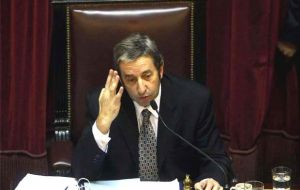MercoPress. South Atlantic News Agency
Argentine Senate knocks out Kirchners farm export tax
 Vice-President Cobos voted against President CFK
Vice-President Cobos voted against President CFK After a dramatic 18hrs session senators tied 36 to 36 in two votes on the measure. Julio Cobos, the vice-president voted against the proposal, breaking the tie. The bill was approved by the lower house of Congress on July 5.
The vote was tied until vice president Julio Cobos who is also leader of the Senate broke the deadlock with a deciding vote against. "I think today is the most difficult day of my life," Cobos said. "They tell me I must go along with the government for institutional reasons, but my heart tells me otherwise. May history judge me, my vote is not for, it's against." Cobos had previously expressed concern about the motives behind tying the tax to the value of grain on the international markets. Cobo's vote could lead to a political crisis. The vice president belongs to the Radical Civic Union party that has traditionally opposed the Peronist party headed by Fernandez. President Cristina Fernandez decreed a more than 10 percent sliding-scale increase in export taxes on soy and other grains in March, in a bid to trap farm products on the Argentine market and drive down prices. The proposed measure led to a confrontation between the government and the agricultural sector, one of the most powerful economic blocs in Argentina. Farmers launched strikes and roadblocks to protest the measure, forcing the president to agree to submit the tax package to a vote in congress. The lower house approved the tax hikes earlier this month and the Senate's approval was the key remaining step for final ratification. It is unclear what steps the executive will take now although the government has said it will abide by the decision. The split vote is clear evidence the ruling bloc is fractured, with supporters of Cristina Fernández, and Néstor Kirchner - her husband, predecessor and Peronist party chief - on one side. On the other was a group of rebel Peronists who back the farmers, question the government's economic management and intricate web of subsidies, or challenge its authoritarian style. "[Party] leaders increasingly feel the government of the Kirchners does not listen to the people," José Manuel de la Sota, a former Peronist governor of the farming province of Córdoba, told to the press: "We're -worried that this is leading Peronism into disaster." "In more than 70 years of political life, I'm seeing unprecedented times," says Antonio Cafiero, a veteran former minister who served under Juan Perón himself. "[The rebels] still don't have a definite leader but they're a group of important Peronist figures," he says. Several prominent provincial governors and former governors in rural areas have publicly broken with the government and Mr de la Sota says Mr Kirchner's power in the party is -crumbling. Mr de la Sota is already toying with running for president in 2011 and says that dissident Peronists will certainly split from the main bloc for next year's mid-term elections, in which the government will have to work hard to avoid losing its majority in Congress. Much depends on what the presidential couple - whom politicians say discipline provincial governors by turning on and off the flow of state funds - does next.




Top Comments
Disclaimer & comment rulesCommenting for this story is now closed.
If you have a Facebook account, become a fan and comment on our Facebook Page!